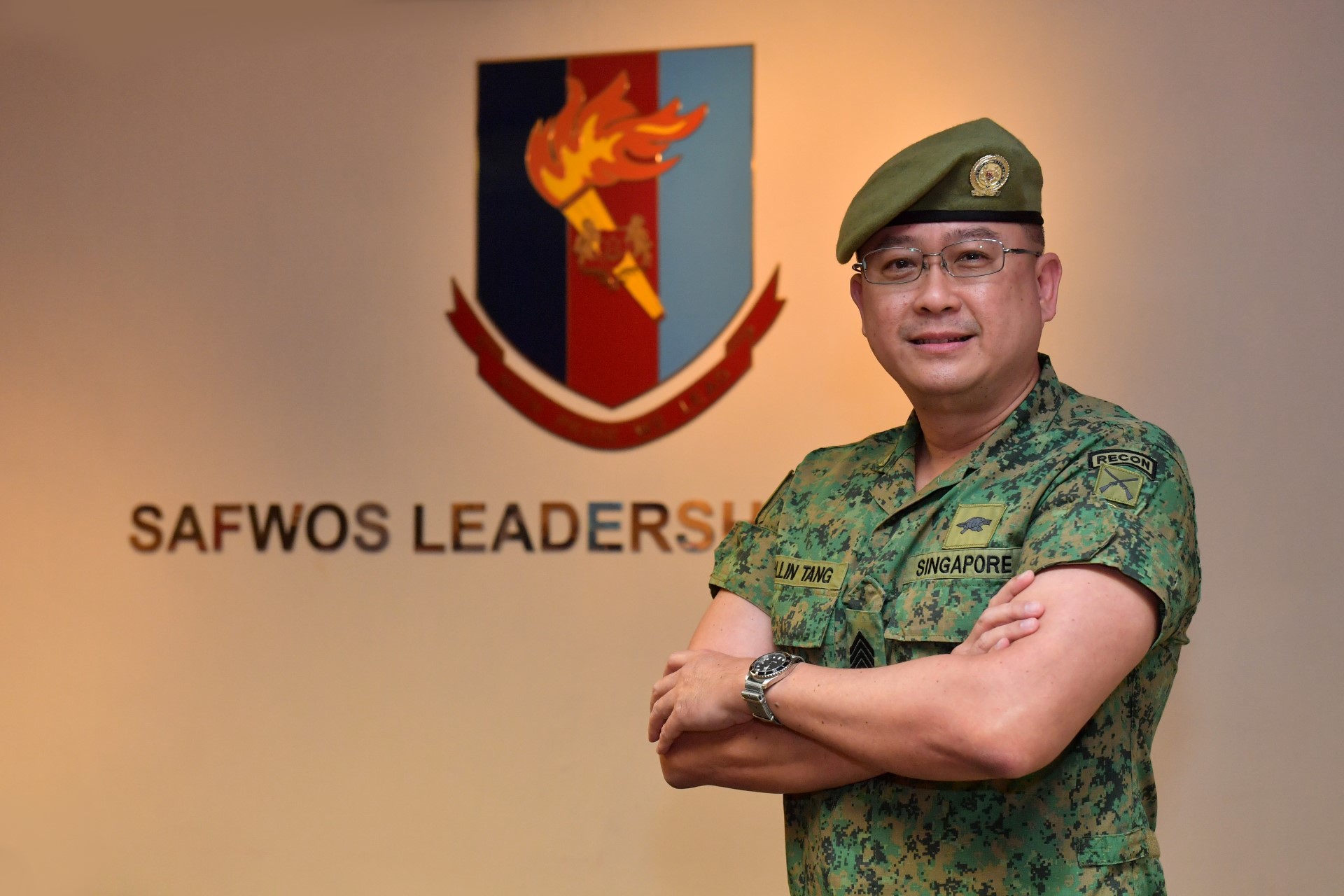Soldier. Leader. Disciplinarian. Encik.
Senior Warrant Officer (SWO) Collin Tang may be described by all of those terms. But at the heart of it all, he sees himself a trainer, grooming soldiers, sailors and airmen in the Singapore Armed Forces (SAF) to take on the mantle of Singapore's defence.
The 50-year-old, who has held positions such as Brigade Intelligence Warrant, Regimental Sergeant Major and Chief Master Trainer, is a firm believer of lifelong learning and personal development.
And his career exemplifies this ethos: he went to polytechnic twice, went from being an infantryman to an Intelligence Specialist, and is currently Chief Instructor of the SAFWOS Leadership School, developing new generations of Warrant Officers and Specialists (WOSpecs).
"The Army is always training for operations. And the people who are very much involved to the training domain are our WOSpecs.
"So, in all the appointments I've held, on top of being a commander or a leader, I have always seen myself as a trainer," he said.
Second chance
As a teenager, SWO Tang did not understand the value of education and ended up dropping out of polytechnic.
"Back then, I was young and immature and didn't prioritise my studies. I was looking for something to give me direction and joined the Army at 17. I had good commanders and mentors. They were exemplary leaders worthy of emulation."
After signing on as an infantryman, he was given a second chance to complete his diploma. He entered Nanyang Polytechnic under sponsorship from the SAF in 1997 and graduated with a Diploma in Manufacturing Engineering. By then, he was already in his mid-twenties.
"But I was more mature and I definitely did better in my studies!" His diploma may not seem directly relevant to his work in the military, but the logical and analytical engineering skills he picked up have become useful in his work.
"This is the benefit of pursuing higher education: it changes the way we think. When I was offered the opportunity to go for my studies, at the time I saw it simply as a means of obtaining educational qualifications; but later on in my career, I realised that it helped to shape my perspectives and worldview."
Nurturing deeper understanding
To SWO Tang, a good soldier is one who understands the deeper meaning of his or her duties, on top of being highly competent in terms of skills and knowledge.
He speaks from experience: when he was younger, he focused on being technically competent but did not fully appreciate the meaning behind his tasks.
"It was only as I progressed in my career that I began to see the context to the skillsets I was required in the appointments I held," he explained.
"So if I'm able to impart this awareness (to our young leaders) that I lacked when I was their age, that would be my key contribution."
Open leadership style
One of the highlights of SWO Tang's career was when he was selected to attend the Joint Warrant Officer Advanced Course (JWOAC) in 2011, at the New Zealand Defence Force (NZDF) Command and Staff College.
The six-week course is the pinnacle course for NZDF warrant officers. SWO Tang was one of two international students in his batch, and the only Singaporean there.
What struck him was the open communication among soldiers across the ranks: "The NZDF warrant officers are very open and forthright with expressing their opinions in day-to-day ops to the leadership; this meant that they formed close relationships with both their officers and soldiers.
"Now, whenever I'm asked for my opinion, I'm better able to articulate opposing perspectives in a confident and professional manner, so that my commanders can make better decisions."
The course helped to further cement his open-minded style of leadership. "Everyone comes from different backgrounds and experiences, and understands things differently.
"That is why we must remain open-minded – when younger leaders make decisions, while their methods may differ, the intent and outcome remain the same."
Developing future leaders
In his 32 years in the SAF, SWO Tang has seen how the soldiers coming through its doors have changed: "When I enlisted in the 90s, if you had an A-Level cert you likely became an officer. Today, degree-holders make up almost 20 per cent of the WOSpec Corps."
This is why trainers at the SAFWOS Leadership School are called "Directing Staff" – their role is to facilitate the learning of the trainees in a self-directed learning environment. They are expected to be facilitators, mentors and coaches.
With the SAFWOS Leadership School celebrating its 30th anniversary on 14 Jan, SWO Tang believes that the institute will continue to grow with the times and develop well-rounded leaders who are able to meet today's challenges.
"We are constantly updating our training pedagogies so that we continue to stay ahead… With highly educated servicemen, we must up our game. And with the increasing complexity of the defence and security environment, our servicemen must be of a greater calibre.
"We have to develop them as good people first – as good soldiers, sailors and airmen, before they can operate in this domain."
